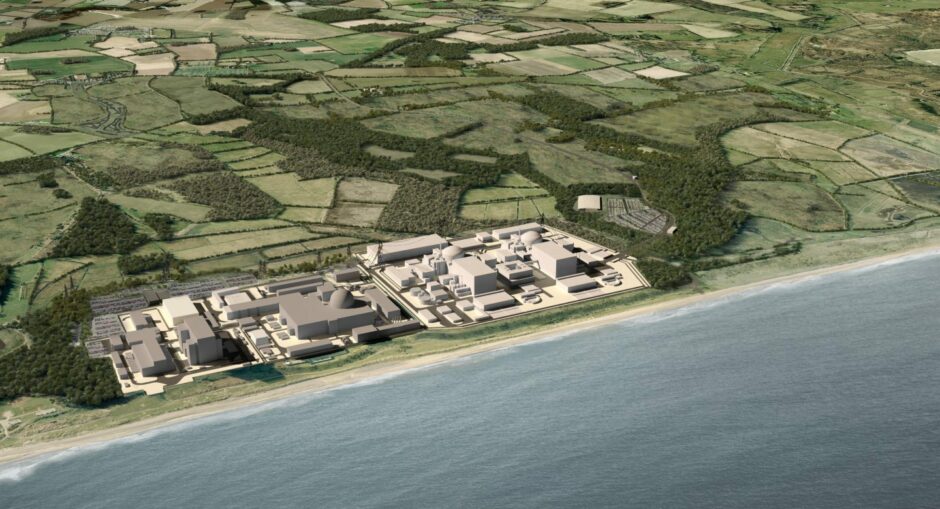
A multibillion-pound project to build a new nuclear power station has been given the go-ahead, more than two years after plans were first submitted.
Development consent was granted by Business Secretary Kwasi Kwarteng for the Sizewell C project in Suffolk, which aims to generate enough low-carbon electricity to supply six million homes, and create thousands of jobs.
Unions and the nuclear industry welcomed the long-awaited decision as a “vital step forward” for energy security.
But campaigners criticised the move, which they said went against the recommendation of the planning inspectorate.
The RSPB’s Minsmere nature reserve, home to avocets, bitterns, marsh harriers and otters, will be affected by the reactor, and the charity said permission had been granted with insufficient consideration for the effects on nature.
Beccy Speight, chief executive of the RSPB, branded it a “ludicrous decision for an interim government to take”.
The secretary of state overrode recommendations of the planning inspectorate not to grant the go-ahead for the scheme unless issues on water supplies and nature were resolved.
In its report, the Examining Authority said it recommended that “unless the outstanding water supply strategy can be resolved and sufficient information provided to enable the secretary of state to carry out his obligations under the Habitats Regulations, the case for an Order granting development consent for the application is not made out”.
Carly Vince, Sizewell C’s chief planning officer, said: “I am delighted that, after months of careful consideration, the Government has given planning consent for Sizewell C.
“It is a big endorsement of our proposals and supports our view that this is the right project in the right place.
“Sizewell C will be good for the region, creating thousands of opportunities for local people and businesses.
“It will boost local biodiversity and leave a legacy Suffolk can be proud of.”
Negotiations with the Government on raising funds for the project are continuing and a Financial Investment Decision is expected in 2023.
Julia Pyke, Sizewell C’s financing director, said: “Energy costs will be lower with nuclear in the mix, so today’s decision is good news for bill-payers.
“The tried and tested funding arrangement we are proposing means that, by paying a small amount during construction, consumers will benefit in the long-term.
“Sizewell C will give a big boost to jobs and skills in nuclear supply chain companies across the country.
“It will strengthen the UK’s energy security and play a key role in our fight against climate change.”
Charlotte Childs, GMB national officer, said: “The UK’s nuclear programme has been delayed too many times due to political decisions.
“We need further investment in nuclear to secure good jobs for the future.”
A spokesman for campaign group Stop Sizewell C said: “The wrong decision has been made but it’s not the end of our campaign.
“Not only will we be looking closely at appealing this decision, we’ll continue to challenge every aspect of Sizewell C, because, whether it is the impact on consumers, the massive costs and delays, the outstanding technical questions or the environmental impacts, it remains a bad project and a very bad risk.
“What’s left of Boris Johnson’s administration should desist from throwing any more cash at Sizewell C or making a Government investment decision.”
Greenpeace UK’s chief scientist, Dr Doug Parr, said: “The contrast between dynamic, cost-cutting and innovative technologies in the renewables sector and the limping behemoths of new nuclear power could barely be more striking.
“Sizewell C represents all that’s been wrong about energy policy.
“A nuclear company, saddled with problems, from failing reactors to having to be nationalised, is getting a stitched-up deal behind closed doors leading to extra costs on energy bills, unmanageable waste for future generations and an expensive white elephant project.
“That it’s trashing an important nature reserve is an unwanted bonus.
“Rather than wasting time and money on this red herring energy solution, the Government should throw everything at making cheaper, cleaner and more reliable renewables the backbone of our energy system.”
Tom Greatrex, chief executive of the Nuclear Industry Association, said: “This is a huge step forward for Britain’s energy security and net zero ambitions.
“Sizewell C will provide reliable low-carbon power for more than 80 years, cutting gas use, creating thousands of high-quality, skilled jobs, and long-term investment and opportunity up and down the country.
“Sizewell C will be one of the UK’s largest ever green energy projects, and this decision significantly strengthens the pipeline of new nuclear capacity in Britain.”
Ms Speight, chief executive of the RSPB, said the charity was “extremely disappointed” at the approval of the power plant that would affect its nature reserve at Minsmere in Suffolk, adding: “The construction of the proposed development will be damaging and it has been granted with insufficient consideration for the effects on nature as described by the Government’s own experts.”
Recommended for you
